Php Ppt
- 1. PHP SUBMITTED BY MURTHY.CH.VSN
- 2. OUTLOOK INTRODUCTION USAGE A SAMPLE CODE OUTPUT DATA TYPES SPEED OPTIMIZATION RESOURCES
- 3. INTRODUCTION WHAT IS PHP? PHPis a scripting langauge that was originally designed for web dovelopement to produce dynamic webpages. For this purpose,PHP code is embedded into HTML PHP was created by Rasmus Lerdrof in 1995. PHP originally stood for ”PERSONAL HOME PAGE”
- 4. USAGE PHP is a general-purpose scripting language that is especially suited to server-side web development where PHP generally runs on a web server. PHP code in a requested file is executed by the PHP runtime, usually to create dynamic web page content. PHP is also used for command-line scripting and client-side GUI applications. PHP can be deployed on most web servers, many operating systems and platforms, and can be used with many relational database management systems.
- 5. A SMALL SAMPLE CODE <html> <head> <title>PHP Test</title> </head> <body> <?php echo "Hello World"; ?> </body>
- 6. OUTPUT Here the out put is ”Hello World”. PHP only parses code within its delimiters. Anything outside its delimiters is sent directly to the output and is not processed by PHP. The most common delimiters are <?php to open and ?> <script language="php"> </script> <?= (which is used to echo back a string or variable) and ?> <% or <%= and %>.
- 7. DATA TYPES PHP stores whole numbers in a platform-dependent range. This range is typically that of 32-bit signed integers. Unsigned integers are converted to signed values in certain situations. Arrays can contain elements of any type that handle in PHP . Including resources, objects, and even other arrays. PHP also supports strings, which can be used with single quotes, double quotes, or heredoc syntax.
- 8. SPEED OPTIMIZATION PHP scripts are stored as human-readable source code and are compiled on-the-fly to an internal format that can be executed by the PHP engine. Code optimizers aim to reduce the runtime of the compiled code by reducing its size and making other changes that can reduce the execution time with the goal of improving performance.
- 9. RESOURCES PHP includes free and open source libraries. PHP is a fundamentally Internet-aware system. Many database servers, embedded SQL libraries such as embedded PostgreSQL, MySQL and SQLite, LDAP servers, and others. PHP allows developers to write extensions in C to add functionality to the PHP language. These can then be compiled into PHP or loaded dynamically at runtime.
- 10. LOGO OF PHP
- 11. Usual file extensions .php, .phtml .php5 .phps Paradigm imperative, object-oriented Appeared in :1995[1] Designed by :Rasmus Lerdorf Developer :The PHP Group Stable release 5.2.13 / 5.3.2 (5.2.13 February 25, 2010; 37 days ago (2010-02-25) / 5.3.2: March 4, 2010; 30 days ago (2010-03-04)) Typing discipline Dynamic, weak Major implementations Zend Engine, Roadsend PHP, Phalanger, Quercus, Project Zero, HipHop Influenced by C, Perl, Java, C++, Tcl[1] Influenced PHP4Delphi Programming language : C OS : Cross-platform License :PHP License Website :http://www.php.net
- 12. THAN ”Q”
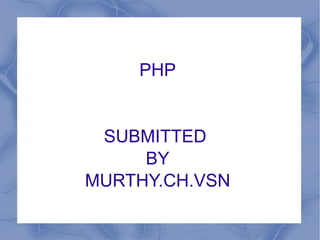
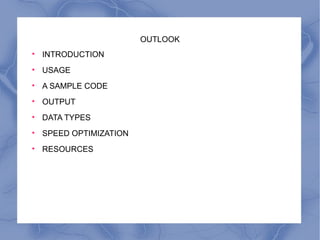
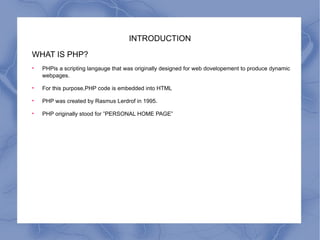
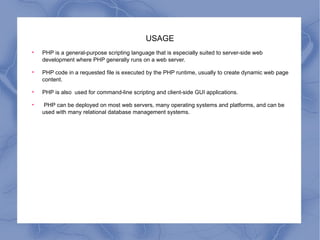
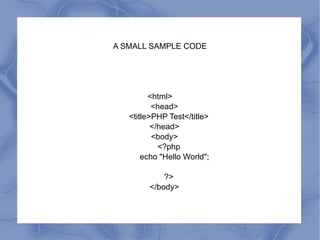
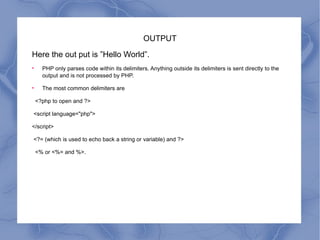

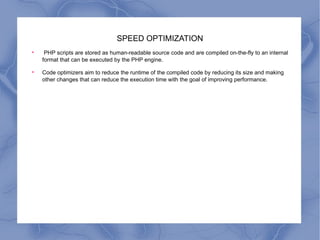
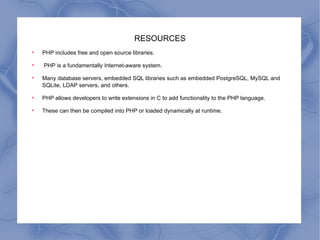
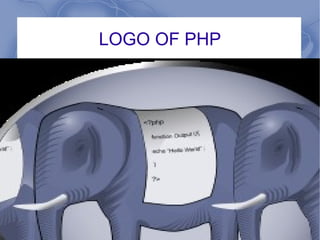
![Usual file extensions .php, .phtml .php5 .phps Paradigm imperative, object-oriented Appeared in :1995[1] Designed by :Rasmus Lerdorf Developer :The PHP Group Stable release 5.2.13 / 5.3.2 (5.2.13 February 25, 2010; 37 days ago (2010-02-25) / 5.3.2: March 4, 2010; 30 days ago (2010-03-04)) Typing discipline Dynamic, weak Major implementations Zend Engine, Roadsend PHP, Phalanger, Quercus, Project Zero, HipHop Influenced by C, Perl, Java, C++, Tcl[1] Influenced PHP4Delphi Programming language : C OS : Cross-platform License :PHP License Website :http://www.php.net](https://image.slidesharecdn.com/phpppt-100403064722-phpapp01/85/Php-Ppt-11-320.jpg)
